Business Law Report: Customer Rights Act 2015 and Implied Terms
VerifiedAdded on 2023/01/13
|8
|2699
|72
Report
AI Summary
This report provides a comprehensive analysis of the Customer Rights Act 2015, focusing on consumer rights within the context of business law. It begins with an introduction to the Act and its importance in securing rights in business transactions, particularly concerning product quality and contract adherence. The report delves into a case study involving a faulty TV purchase, exploring the implications of implied terms and the Sale of Goods Act 1979, including sections related to pricing, third-party contracts, and buyer responsibilities. The analysis extends to advising the consumer on their rights, including compensation for warranty breaches and legal recourse under consumer protection laws. The report also examines the transfer of goods and the importance of ascertaining goods before a sale. Furthermore, it discusses various remedies for breach of contract, including specific performance and anticipatory breach, and concludes with an overview of product liability under the Consumer Protection Act 1987. The report references relevant legal cases to support its arguments and provide practical insights into consumer rights and business law principles.
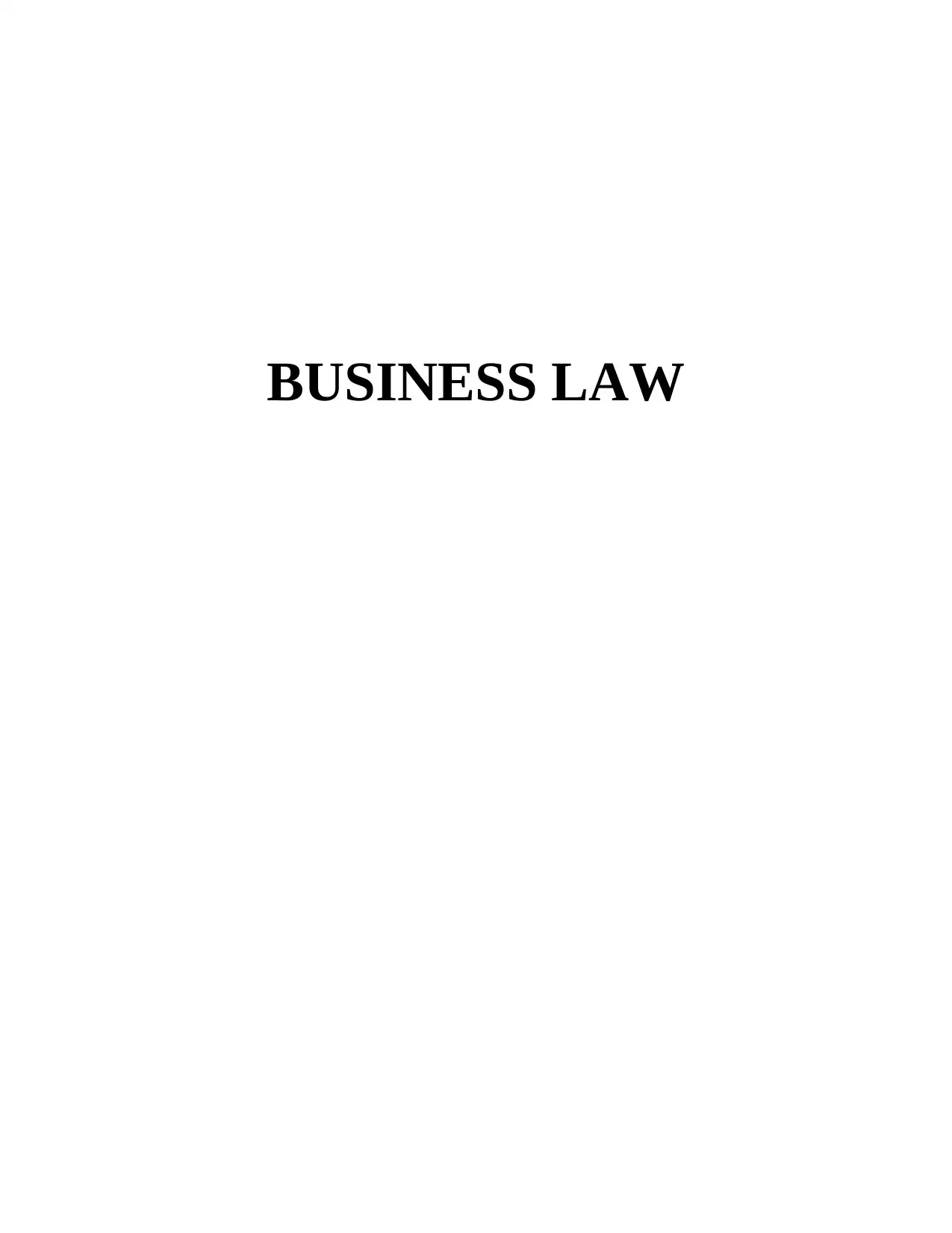
BUSINESS LAW
Paraphrase This Document
Need a fresh take? Get an instant paraphrase of this document with our AI Paraphraser
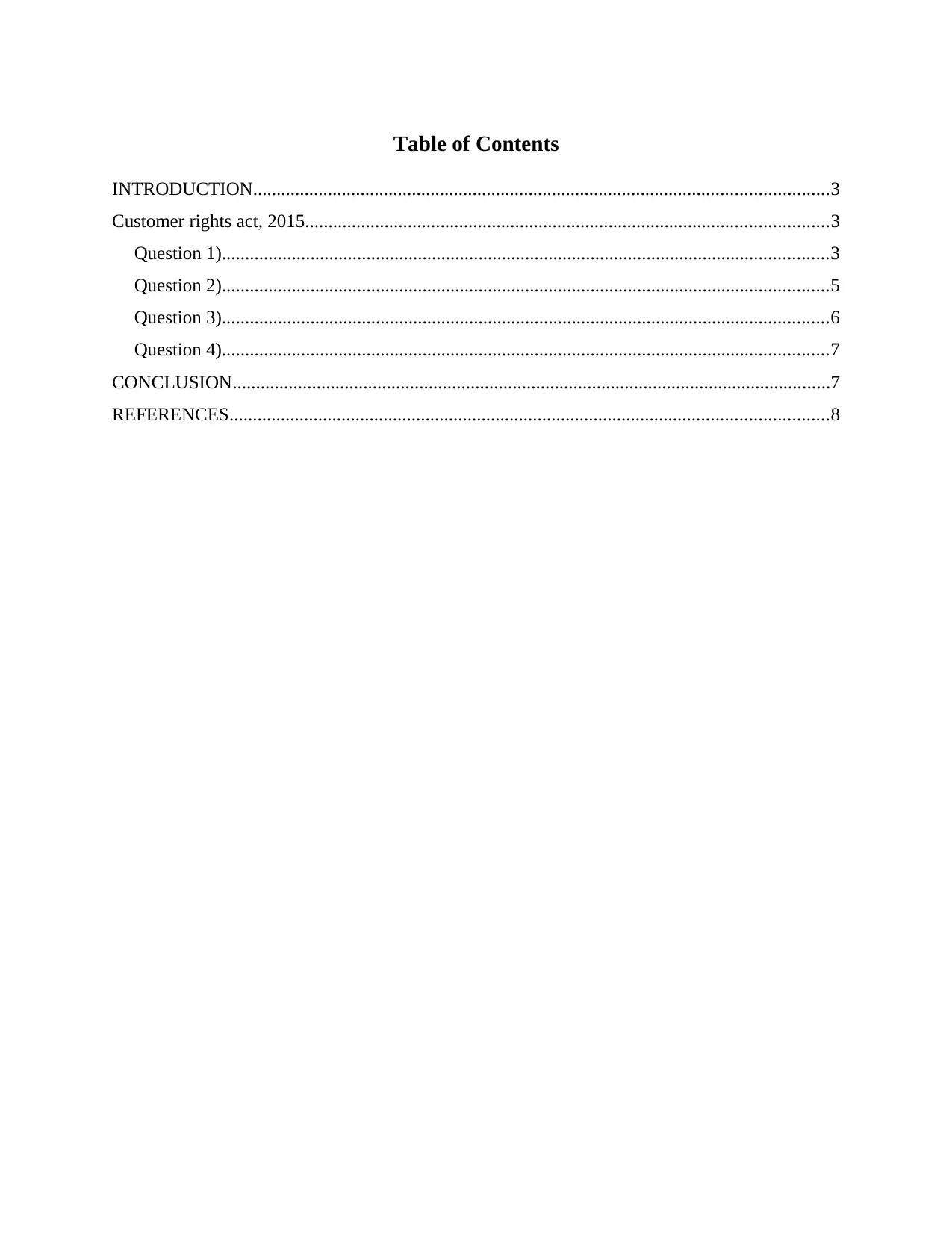
Table of Contents
INTRODUCTION...........................................................................................................................3
Customer rights act, 2015................................................................................................................3
Question 1)..................................................................................................................................3
Question 2)..................................................................................................................................5
Question 3)..................................................................................................................................6
Question 4)..................................................................................................................................7
CONCLUSION................................................................................................................................7
REFERENCES................................................................................................................................8
INTRODUCTION...........................................................................................................................3
Customer rights act, 2015................................................................................................................3
Question 1)..................................................................................................................................3
Question 2)..................................................................................................................................5
Question 3)..................................................................................................................................6
Question 4)..................................................................................................................................7
CONCLUSION................................................................................................................................7
REFERENCES................................................................................................................................8
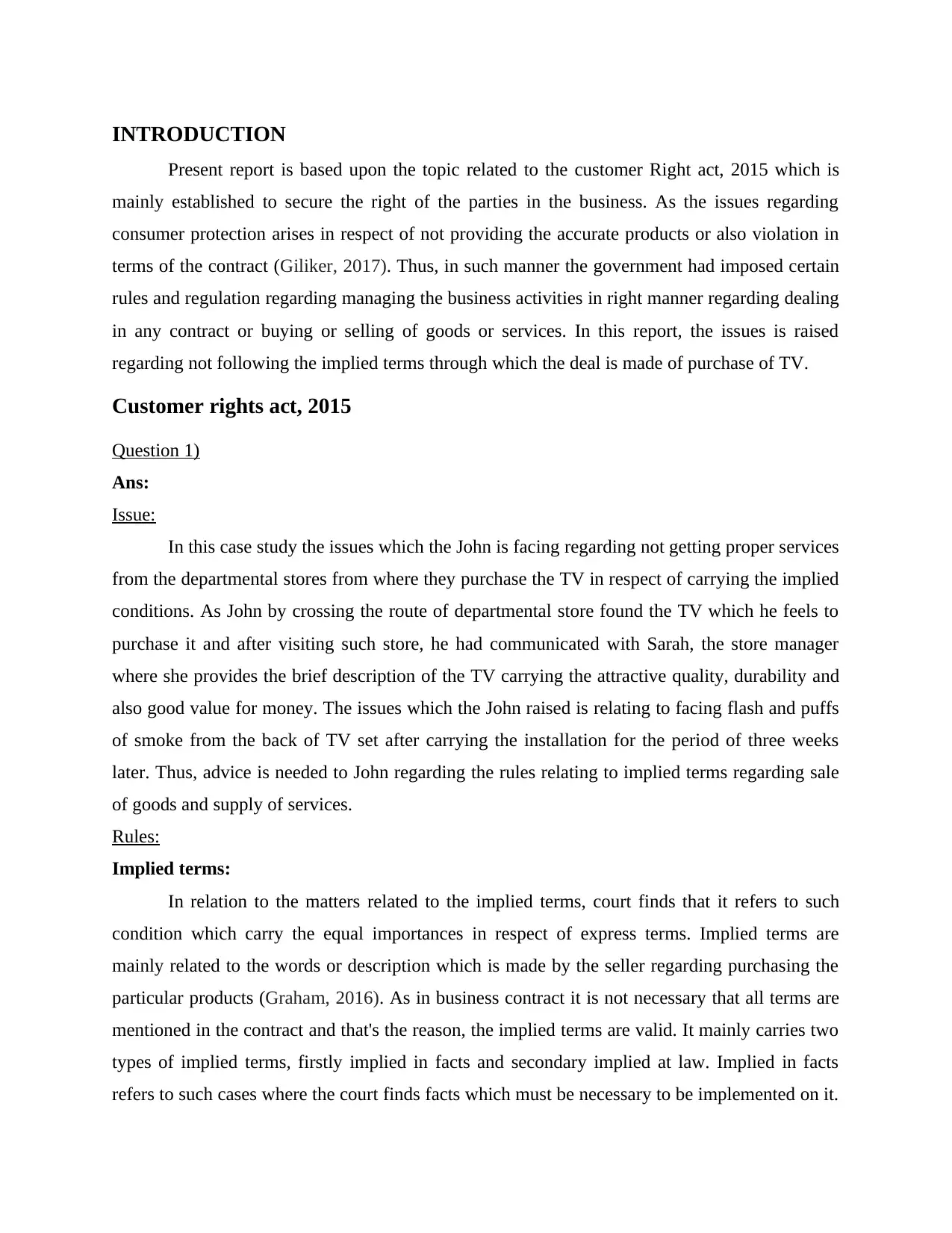
INTRODUCTION
Present report is based upon the topic related to the customer Right act, 2015 which is
mainly established to secure the right of the parties in the business. As the issues regarding
consumer protection arises in respect of not providing the accurate products or also violation in
terms of the contract (Giliker, 2017). Thus, in such manner the government had imposed certain
rules and regulation regarding managing the business activities in right manner regarding dealing
in any contract or buying or selling of goods or services. In this report, the issues is raised
regarding not following the implied terms through which the deal is made of purchase of TV.
Customer rights act, 2015
Question 1)
Ans:
Issue:
In this case study the issues which the John is facing regarding not getting proper services
from the departmental stores from where they purchase the TV in respect of carrying the implied
conditions. As John by crossing the route of departmental store found the TV which he feels to
purchase it and after visiting such store, he had communicated with Sarah, the store manager
where she provides the brief description of the TV carrying the attractive quality, durability and
also good value for money. The issues which the John raised is relating to facing flash and puffs
of smoke from the back of TV set after carrying the installation for the period of three weeks
later. Thus, advice is needed to John regarding the rules relating to implied terms regarding sale
of goods and supply of services.
Rules:
Implied terms:
In relation to the matters related to the implied terms, court finds that it refers to such
condition which carry the equal importances in respect of express terms. Implied terms are
mainly related to the words or description which is made by the seller regarding purchasing the
particular products (Graham, 2016). As in business contract it is not necessary that all terms are
mentioned in the contract and that's the reason, the implied terms are valid. It mainly carries two
types of implied terms, firstly implied in facts and secondary implied at law. Implied in facts
refers to such cases where the court finds facts which must be necessary to be implemented on it.
Present report is based upon the topic related to the customer Right act, 2015 which is
mainly established to secure the right of the parties in the business. As the issues regarding
consumer protection arises in respect of not providing the accurate products or also violation in
terms of the contract (Giliker, 2017). Thus, in such manner the government had imposed certain
rules and regulation regarding managing the business activities in right manner regarding dealing
in any contract or buying or selling of goods or services. In this report, the issues is raised
regarding not following the implied terms through which the deal is made of purchase of TV.
Customer rights act, 2015
Question 1)
Ans:
Issue:
In this case study the issues which the John is facing regarding not getting proper services
from the departmental stores from where they purchase the TV in respect of carrying the implied
conditions. As John by crossing the route of departmental store found the TV which he feels to
purchase it and after visiting such store, he had communicated with Sarah, the store manager
where she provides the brief description of the TV carrying the attractive quality, durability and
also good value for money. The issues which the John raised is relating to facing flash and puffs
of smoke from the back of TV set after carrying the installation for the period of three weeks
later. Thus, advice is needed to John regarding the rules relating to implied terms regarding sale
of goods and supply of services.
Rules:
Implied terms:
In relation to the matters related to the implied terms, court finds that it refers to such
condition which carry the equal importances in respect of express terms. Implied terms are
mainly related to the words or description which is made by the seller regarding purchasing the
particular products (Graham, 2016). As in business contract it is not necessary that all terms are
mentioned in the contract and that's the reason, the implied terms are valid. It mainly carries two
types of implied terms, firstly implied in facts and secondary implied at law. Implied in facts
refers to such cases where the court finds facts which must be necessary to be implemented on it.
⊘ This is a preview!⊘
Do you want full access?
Subscribe today to unlock all pages.

Trusted by 1+ million students worldwide
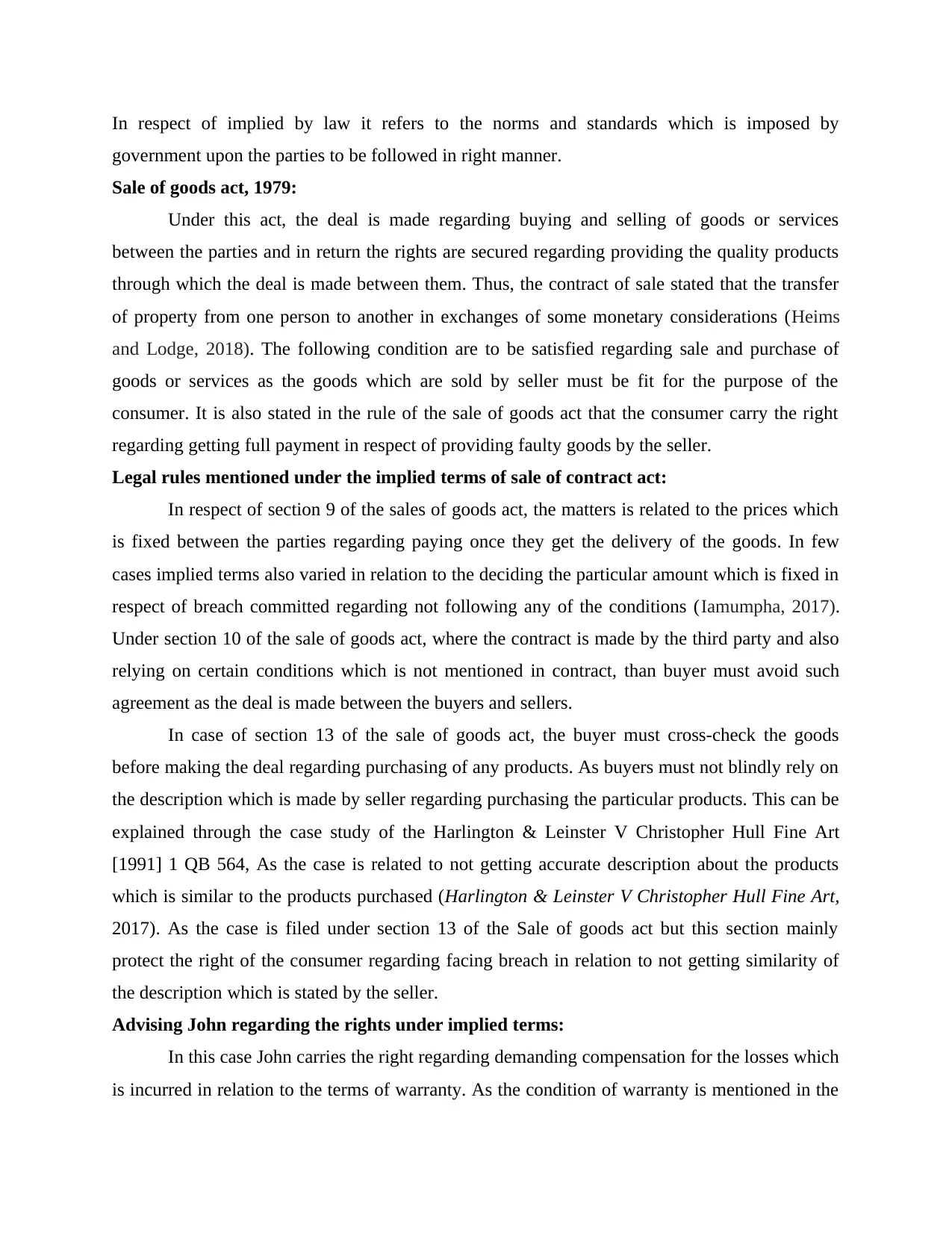
In respect of implied by law it refers to the norms and standards which is imposed by
government upon the parties to be followed in right manner.
Sale of goods act, 1979:
Under this act, the deal is made regarding buying and selling of goods or services
between the parties and in return the rights are secured regarding providing the quality products
through which the deal is made between them. Thus, the contract of sale stated that the transfer
of property from one person to another in exchanges of some monetary considerations (Heims
and Lodge, 2018). The following condition are to be satisfied regarding sale and purchase of
goods or services as the goods which are sold by seller must be fit for the purpose of the
consumer. It is also stated in the rule of the sale of goods act that the consumer carry the right
regarding getting full payment in respect of providing faulty goods by the seller.
Legal rules mentioned under the implied terms of sale of contract act:
In respect of section 9 of the sales of goods act, the matters is related to the prices which
is fixed between the parties regarding paying once they get the delivery of the goods. In few
cases implied terms also varied in relation to the deciding the particular amount which is fixed in
respect of breach committed regarding not following any of the conditions (Iamumpha, 2017).
Under section 10 of the sale of goods act, where the contract is made by the third party and also
relying on certain conditions which is not mentioned in contract, than buyer must avoid such
agreement as the deal is made between the buyers and sellers.
In case of section 13 of the sale of goods act, the buyer must cross-check the goods
before making the deal regarding purchasing of any products. As buyers must not blindly rely on
the description which is made by seller regarding purchasing the particular products. This can be
explained through the case study of the Harlington & Leinster V Christopher Hull Fine Art
[1991] 1 QB 564, As the case is related to not getting accurate description about the products
which is similar to the products purchased (Harlington & Leinster V Christopher Hull Fine Art,
2017). As the case is filed under section 13 of the Sale of goods act but this section mainly
protect the right of the consumer regarding facing breach in relation to not getting similarity of
the description which is stated by the seller.
Advising John regarding the rights under implied terms:
In this case John carries the right regarding demanding compensation for the losses which
is incurred in relation to the terms of warranty. As the condition of warranty is mentioned in the
government upon the parties to be followed in right manner.
Sale of goods act, 1979:
Under this act, the deal is made regarding buying and selling of goods or services
between the parties and in return the rights are secured regarding providing the quality products
through which the deal is made between them. Thus, the contract of sale stated that the transfer
of property from one person to another in exchanges of some monetary considerations (Heims
and Lodge, 2018). The following condition are to be satisfied regarding sale and purchase of
goods or services as the goods which are sold by seller must be fit for the purpose of the
consumer. It is also stated in the rule of the sale of goods act that the consumer carry the right
regarding getting full payment in respect of providing faulty goods by the seller.
Legal rules mentioned under the implied terms of sale of contract act:
In respect of section 9 of the sales of goods act, the matters is related to the prices which
is fixed between the parties regarding paying once they get the delivery of the goods. In few
cases implied terms also varied in relation to the deciding the particular amount which is fixed in
respect of breach committed regarding not following any of the conditions (Iamumpha, 2017).
Under section 10 of the sale of goods act, where the contract is made by the third party and also
relying on certain conditions which is not mentioned in contract, than buyer must avoid such
agreement as the deal is made between the buyers and sellers.
In case of section 13 of the sale of goods act, the buyer must cross-check the goods
before making the deal regarding purchasing of any products. As buyers must not blindly rely on
the description which is made by seller regarding purchasing the particular products. This can be
explained through the case study of the Harlington & Leinster V Christopher Hull Fine Art
[1991] 1 QB 564, As the case is related to not getting accurate description about the products
which is similar to the products purchased (Harlington & Leinster V Christopher Hull Fine Art,
2017). As the case is filed under section 13 of the Sale of goods act but this section mainly
protect the right of the consumer regarding facing breach in relation to not getting similarity of
the description which is stated by the seller.
Advising John regarding the rights under implied terms:
In this case John carries the right regarding demanding compensation for the losses which
is incurred in relation to the terms of warranty. As the condition of warranty is mentioned in the
Paraphrase This Document
Need a fresh take? Get an instant paraphrase of this document with our AI Paraphraser
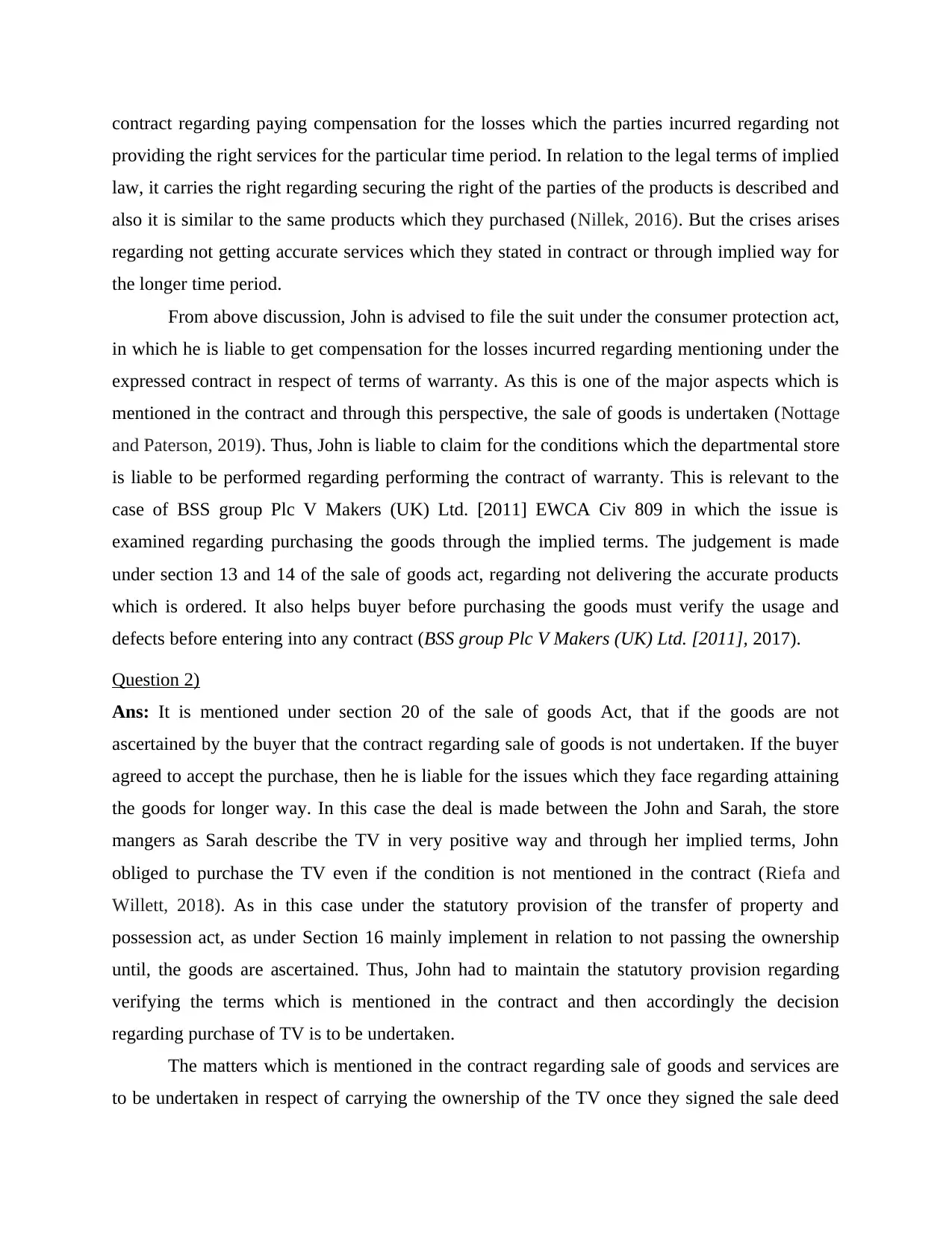
contract regarding paying compensation for the losses which the parties incurred regarding not
providing the right services for the particular time period. In relation to the legal terms of implied
law, it carries the right regarding securing the right of the parties of the products is described and
also it is similar to the same products which they purchased (Nillek, 2016). But the crises arises
regarding not getting accurate services which they stated in contract or through implied way for
the longer time period.
From above discussion, John is advised to file the suit under the consumer protection act,
in which he is liable to get compensation for the losses incurred regarding mentioning under the
expressed contract in respect of terms of warranty. As this is one of the major aspects which is
mentioned in the contract and through this perspective, the sale of goods is undertaken (Nottage
and Paterson, 2019). Thus, John is liable to claim for the conditions which the departmental store
is liable to be performed regarding performing the contract of warranty. This is relevant to the
case of BSS group Plc V Makers (UK) Ltd. [2011] EWCA Civ 809 in which the issue is
examined regarding purchasing the goods through the implied terms. The judgement is made
under section 13 and 14 of the sale of goods act, regarding not delivering the accurate products
which is ordered. It also helps buyer before purchasing the goods must verify the usage and
defects before entering into any contract (BSS group Plc V Makers (UK) Ltd. [2011], 2017).
Question 2)
Ans: It is mentioned under section 20 of the sale of goods Act, that if the goods are not
ascertained by the buyer that the contract regarding sale of goods is not undertaken. If the buyer
agreed to accept the purchase, then he is liable for the issues which they face regarding attaining
the goods for longer way. In this case the deal is made between the John and Sarah, the store
mangers as Sarah describe the TV in very positive way and through her implied terms, John
obliged to purchase the TV even if the condition is not mentioned in the contract (Riefa and
Willett, 2018). As in this case under the statutory provision of the transfer of property and
possession act, as under Section 16 mainly implement in relation to not passing the ownership
until, the goods are ascertained. Thus, John had to maintain the statutory provision regarding
verifying the terms which is mentioned in the contract and then accordingly the decision
regarding purchase of TV is to be undertaken.
The matters which is mentioned in the contract regarding sale of goods and services are
to be undertaken in respect of carrying the ownership of the TV once they signed the sale deed
providing the right services for the particular time period. In relation to the legal terms of implied
law, it carries the right regarding securing the right of the parties of the products is described and
also it is similar to the same products which they purchased (Nillek, 2016). But the crises arises
regarding not getting accurate services which they stated in contract or through implied way for
the longer time period.
From above discussion, John is advised to file the suit under the consumer protection act,
in which he is liable to get compensation for the losses incurred regarding mentioning under the
expressed contract in respect of terms of warranty. As this is one of the major aspects which is
mentioned in the contract and through this perspective, the sale of goods is undertaken (Nottage
and Paterson, 2019). Thus, John is liable to claim for the conditions which the departmental store
is liable to be performed regarding performing the contract of warranty. This is relevant to the
case of BSS group Plc V Makers (UK) Ltd. [2011] EWCA Civ 809 in which the issue is
examined regarding purchasing the goods through the implied terms. The judgement is made
under section 13 and 14 of the sale of goods act, regarding not delivering the accurate products
which is ordered. It also helps buyer before purchasing the goods must verify the usage and
defects before entering into any contract (BSS group Plc V Makers (UK) Ltd. [2011], 2017).
Question 2)
Ans: It is mentioned under section 20 of the sale of goods Act, that if the goods are not
ascertained by the buyer that the contract regarding sale of goods is not undertaken. If the buyer
agreed to accept the purchase, then he is liable for the issues which they face regarding attaining
the goods for longer way. In this case the deal is made between the John and Sarah, the store
mangers as Sarah describe the TV in very positive way and through her implied terms, John
obliged to purchase the TV even if the condition is not mentioned in the contract (Riefa and
Willett, 2018). As in this case under the statutory provision of the transfer of property and
possession act, as under Section 16 mainly implement in relation to not passing the ownership
until, the goods are ascertained. Thus, John had to maintain the statutory provision regarding
verifying the terms which is mentioned in the contract and then accordingly the decision
regarding purchase of TV is to be undertaken.
The matters which is mentioned in the contract regarding sale of goods and services are
to be undertaken in respect of carrying the ownership of the TV once they signed the sale deed
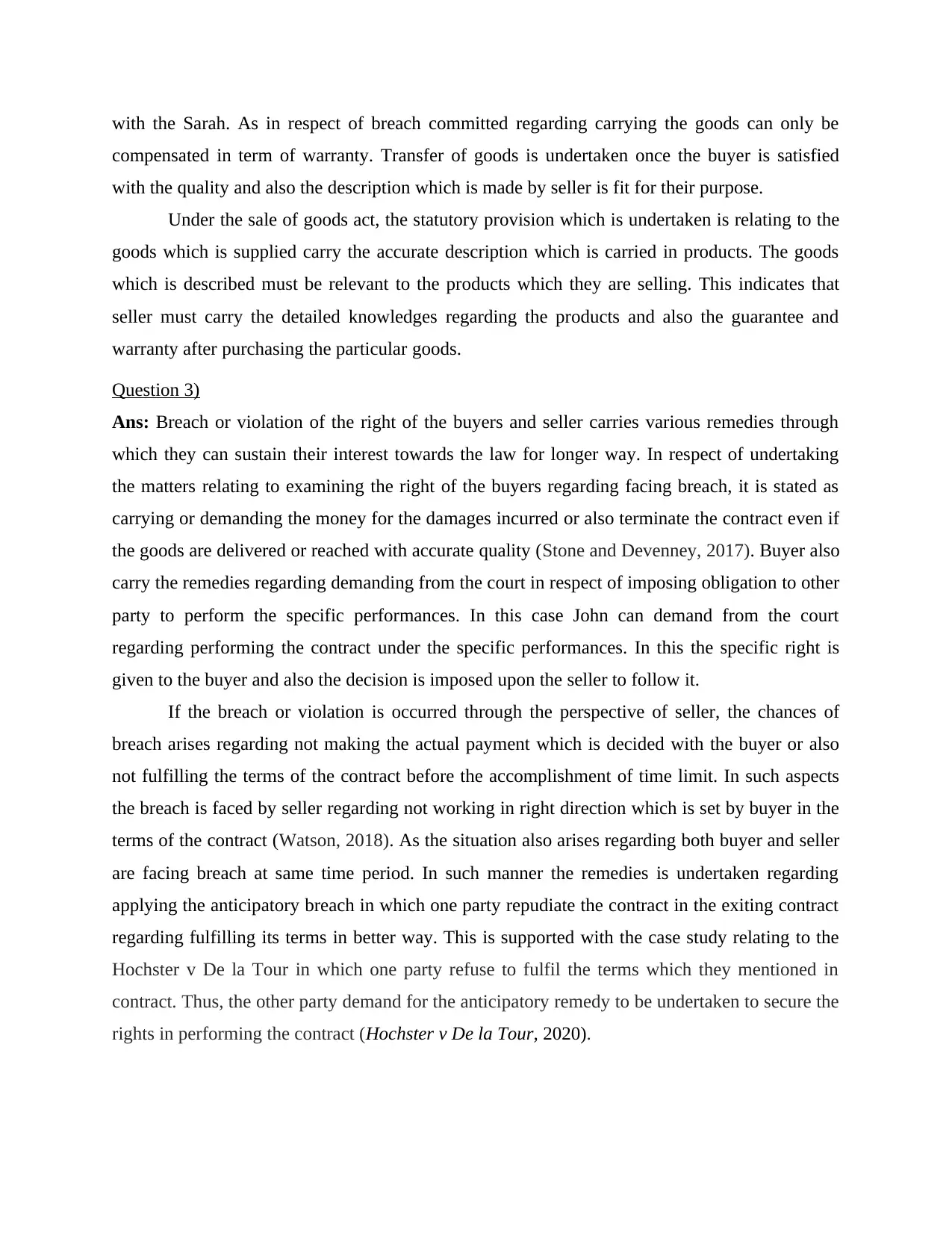
with the Sarah. As in respect of breach committed regarding carrying the goods can only be
compensated in term of warranty. Transfer of goods is undertaken once the buyer is satisfied
with the quality and also the description which is made by seller is fit for their purpose.
Under the sale of goods act, the statutory provision which is undertaken is relating to the
goods which is supplied carry the accurate description which is carried in products. The goods
which is described must be relevant to the products which they are selling. This indicates that
seller must carry the detailed knowledges regarding the products and also the guarantee and
warranty after purchasing the particular goods.
Question 3)
Ans: Breach or violation of the right of the buyers and seller carries various remedies through
which they can sustain their interest towards the law for longer way. In respect of undertaking
the matters relating to examining the right of the buyers regarding facing breach, it is stated as
carrying or demanding the money for the damages incurred or also terminate the contract even if
the goods are delivered or reached with accurate quality (Stone and Devenney, 2017). Buyer also
carry the remedies regarding demanding from the court in respect of imposing obligation to other
party to perform the specific performances. In this case John can demand from the court
regarding performing the contract under the specific performances. In this the specific right is
given to the buyer and also the decision is imposed upon the seller to follow it.
If the breach or violation is occurred through the perspective of seller, the chances of
breach arises regarding not making the actual payment which is decided with the buyer or also
not fulfilling the terms of the contract before the accomplishment of time limit. In such aspects
the breach is faced by seller regarding not working in right direction which is set by buyer in the
terms of the contract (Watson, 2018). As the situation also arises regarding both buyer and seller
are facing breach at same time period. In such manner the remedies is undertaken regarding
applying the anticipatory breach in which one party repudiate the contract in the exiting contract
regarding fulfilling its terms in better way. This is supported with the case study relating to the
Hochster v De la Tour in which one party refuse to fulfil the terms which they mentioned in
contract. Thus, the other party demand for the anticipatory remedy to be undertaken to secure the
rights in performing the contract (Hochster v De la Tour, 2020).
compensated in term of warranty. Transfer of goods is undertaken once the buyer is satisfied
with the quality and also the description which is made by seller is fit for their purpose.
Under the sale of goods act, the statutory provision which is undertaken is relating to the
goods which is supplied carry the accurate description which is carried in products. The goods
which is described must be relevant to the products which they are selling. This indicates that
seller must carry the detailed knowledges regarding the products and also the guarantee and
warranty after purchasing the particular goods.
Question 3)
Ans: Breach or violation of the right of the buyers and seller carries various remedies through
which they can sustain their interest towards the law for longer way. In respect of undertaking
the matters relating to examining the right of the buyers regarding facing breach, it is stated as
carrying or demanding the money for the damages incurred or also terminate the contract even if
the goods are delivered or reached with accurate quality (Stone and Devenney, 2017). Buyer also
carry the remedies regarding demanding from the court in respect of imposing obligation to other
party to perform the specific performances. In this case John can demand from the court
regarding performing the contract under the specific performances. In this the specific right is
given to the buyer and also the decision is imposed upon the seller to follow it.
If the breach or violation is occurred through the perspective of seller, the chances of
breach arises regarding not making the actual payment which is decided with the buyer or also
not fulfilling the terms of the contract before the accomplishment of time limit. In such aspects
the breach is faced by seller regarding not working in right direction which is set by buyer in the
terms of the contract (Watson, 2018). As the situation also arises regarding both buyer and seller
are facing breach at same time period. In such manner the remedies is undertaken regarding
applying the anticipatory breach in which one party repudiate the contract in the exiting contract
regarding fulfilling its terms in better way. This is supported with the case study relating to the
Hochster v De la Tour in which one party refuse to fulfil the terms which they mentioned in
contract. Thus, the other party demand for the anticipatory remedy to be undertaken to secure the
rights in performing the contract (Hochster v De la Tour, 2020).
⊘ This is a preview!⊘
Do you want full access?
Subscribe today to unlock all pages.

Trusted by 1+ million students worldwide
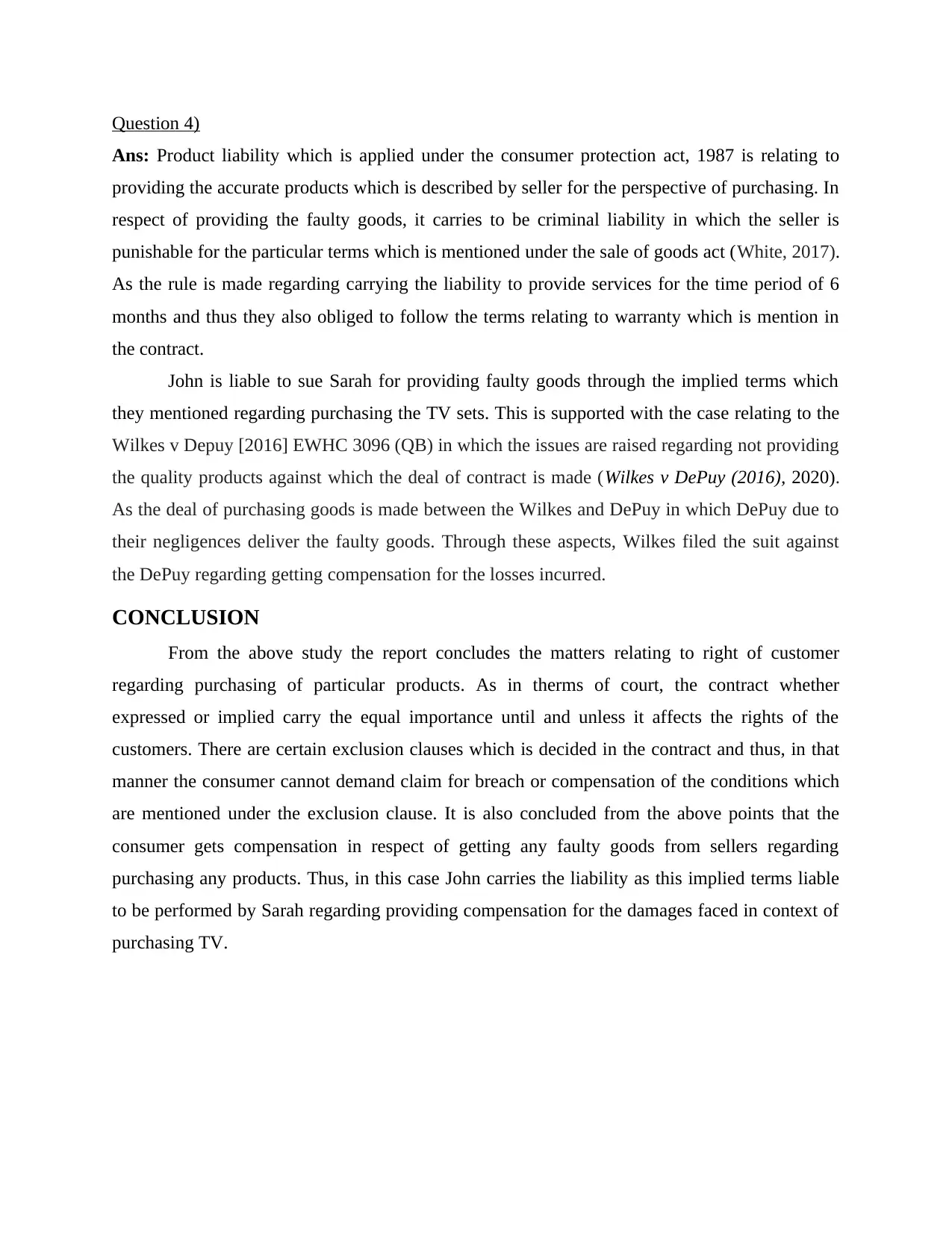
Question 4)
Ans: Product liability which is applied under the consumer protection act, 1987 is relating to
providing the accurate products which is described by seller for the perspective of purchasing. In
respect of providing the faulty goods, it carries to be criminal liability in which the seller is
punishable for the particular terms which is mentioned under the sale of goods act (White, 2017).
As the rule is made regarding carrying the liability to provide services for the time period of 6
months and thus they also obliged to follow the terms relating to warranty which is mention in
the contract.
John is liable to sue Sarah for providing faulty goods through the implied terms which
they mentioned regarding purchasing the TV sets. This is supported with the case relating to the
Wilkes v Depuy [2016] EWHC 3096 (QB) in which the issues are raised regarding not providing
the quality products against which the deal of contract is made (Wilkes v DePuy (2016), 2020).
As the deal of purchasing goods is made between the Wilkes and DePuy in which DePuy due to
their negligences deliver the faulty goods. Through these aspects, Wilkes filed the suit against
the DePuy regarding getting compensation for the losses incurred.
CONCLUSION
From the above study the report concludes the matters relating to right of customer
regarding purchasing of particular products. As in therms of court, the contract whether
expressed or implied carry the equal importance until and unless it affects the rights of the
customers. There are certain exclusion clauses which is decided in the contract and thus, in that
manner the consumer cannot demand claim for breach or compensation of the conditions which
are mentioned under the exclusion clause. It is also concluded from the above points that the
consumer gets compensation in respect of getting any faulty goods from sellers regarding
purchasing any products. Thus, in this case John carries the liability as this implied terms liable
to be performed by Sarah regarding providing compensation for the damages faced in context of
purchasing TV.
Ans: Product liability which is applied under the consumer protection act, 1987 is relating to
providing the accurate products which is described by seller for the perspective of purchasing. In
respect of providing the faulty goods, it carries to be criminal liability in which the seller is
punishable for the particular terms which is mentioned under the sale of goods act (White, 2017).
As the rule is made regarding carrying the liability to provide services for the time period of 6
months and thus they also obliged to follow the terms relating to warranty which is mention in
the contract.
John is liable to sue Sarah for providing faulty goods through the implied terms which
they mentioned regarding purchasing the TV sets. This is supported with the case relating to the
Wilkes v Depuy [2016] EWHC 3096 (QB) in which the issues are raised regarding not providing
the quality products against which the deal of contract is made (Wilkes v DePuy (2016), 2020).
As the deal of purchasing goods is made between the Wilkes and DePuy in which DePuy due to
their negligences deliver the faulty goods. Through these aspects, Wilkes filed the suit against
the DePuy regarding getting compensation for the losses incurred.
CONCLUSION
From the above study the report concludes the matters relating to right of customer
regarding purchasing of particular products. As in therms of court, the contract whether
expressed or implied carry the equal importance until and unless it affects the rights of the
customers. There are certain exclusion clauses which is decided in the contract and thus, in that
manner the consumer cannot demand claim for breach or compensation of the conditions which
are mentioned under the exclusion clause. It is also concluded from the above points that the
consumer gets compensation in respect of getting any faulty goods from sellers regarding
purchasing any products. Thus, in this case John carries the liability as this implied terms liable
to be performed by Sarah regarding providing compensation for the damages faced in context of
purchasing TV.
Paraphrase This Document
Need a fresh take? Get an instant paraphrase of this document with our AI Paraphraser
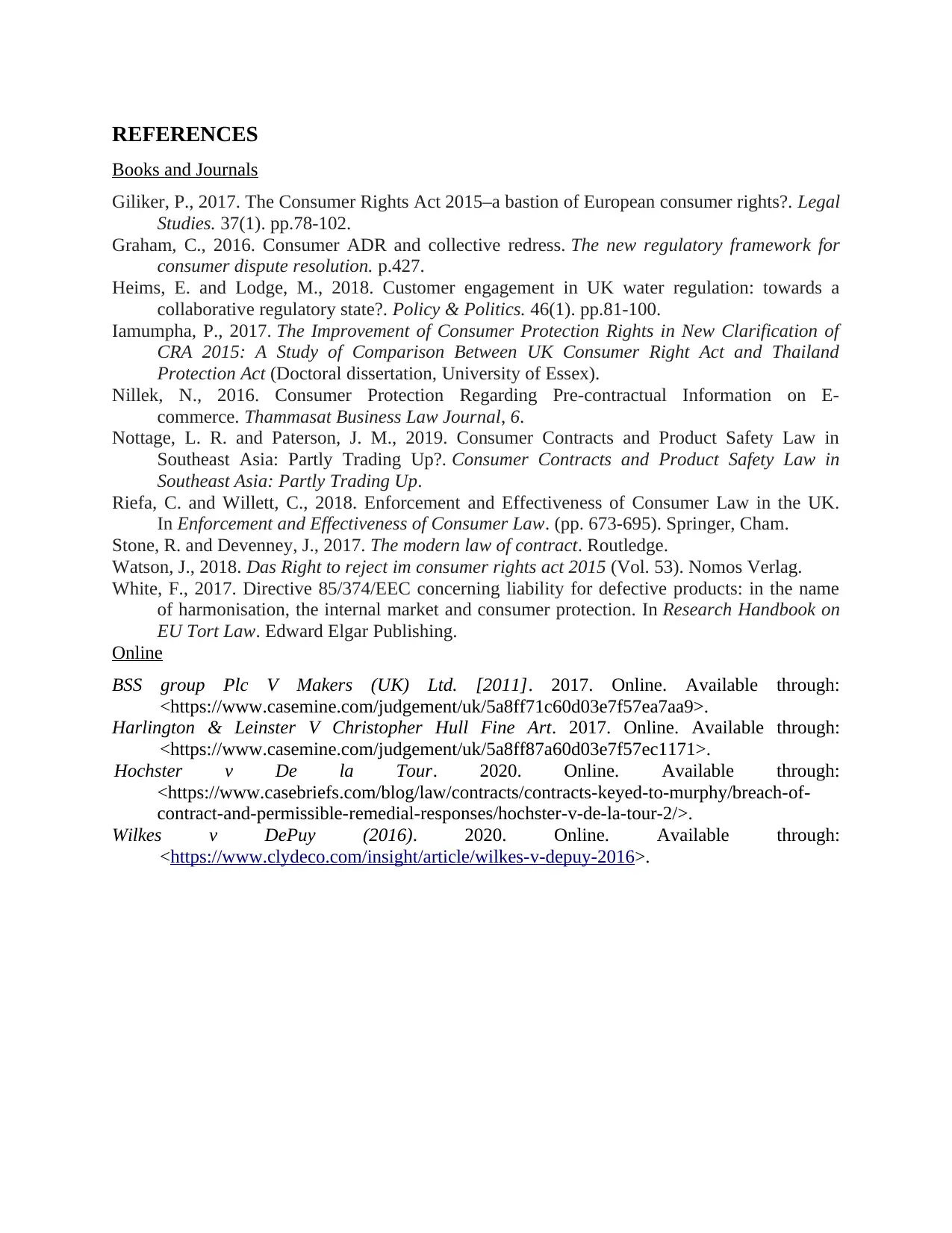
REFERENCES
Books and Journals
Giliker, P., 2017. The Consumer Rights Act 2015–a bastion of European consumer rights?. Legal
Studies. 37(1). pp.78-102.
Graham, C., 2016. Consumer ADR and collective redress. The new regulatory framework for
consumer dispute resolution. p.427.
Heims, E. and Lodge, M., 2018. Customer engagement in UK water regulation: towards a
collaborative regulatory state?. Policy & Politics. 46(1). pp.81-100.
Iamumpha, P., 2017. The Improvement of Consumer Protection Rights in New Clarification of
CRA 2015: A Study of Comparison Between UK Consumer Right Act and Thailand
Protection Act (Doctoral dissertation, University of Essex).
Nillek, N., 2016. Consumer Protection Regarding Pre-contractual Information on E-
commerce. Thammasat Business Law Journal, 6.
Nottage, L. R. and Paterson, J. M., 2019. Consumer Contracts and Product Safety Law in
Southeast Asia: Partly Trading Up?. Consumer Contracts and Product Safety Law in
Southeast Asia: Partly Trading Up.
Riefa, C. and Willett, C., 2018. Enforcement and Effectiveness of Consumer Law in the UK.
In Enforcement and Effectiveness of Consumer Law. (pp. 673-695). Springer, Cham.
Stone, R. and Devenney, J., 2017. The modern law of contract. Routledge.
Watson, J., 2018. Das Right to reject im consumer rights act 2015 (Vol. 53). Nomos Verlag.
White, F., 2017. Directive 85/374/EEC concerning liability for defective products: in the name
of harmonisation, the internal market and consumer protection. In Research Handbook on
EU Tort Law. Edward Elgar Publishing.
Online
BSS group Plc V Makers (UK) Ltd. [2011]. 2017. Online. Available through:
<https://www.casemine.com/judgement/uk/5a8ff71c60d03e7f57ea7aa9>.
Harlington & Leinster V Christopher Hull Fine Art. 2017. Online. Available through:
<https://www.casemine.com/judgement/uk/5a8ff87a60d03e7f57ec1171>.
Hochster v De la Tour. 2020. Online. Available through:
<https://www.casebriefs.com/blog/law/contracts/contracts-keyed-to-murphy/breach-of-
contract-and-permissible-remedial-responses/hochster-v-de-la-tour-2/>.
Wilkes v DePuy (2016). 2020. Online. Available through:
<https://www.clydeco.com/insight/article/wilkes-v-depuy-2016>.
Books and Journals
Giliker, P., 2017. The Consumer Rights Act 2015–a bastion of European consumer rights?. Legal
Studies. 37(1). pp.78-102.
Graham, C., 2016. Consumer ADR and collective redress. The new regulatory framework for
consumer dispute resolution. p.427.
Heims, E. and Lodge, M., 2018. Customer engagement in UK water regulation: towards a
collaborative regulatory state?. Policy & Politics. 46(1). pp.81-100.
Iamumpha, P., 2017. The Improvement of Consumer Protection Rights in New Clarification of
CRA 2015: A Study of Comparison Between UK Consumer Right Act and Thailand
Protection Act (Doctoral dissertation, University of Essex).
Nillek, N., 2016. Consumer Protection Regarding Pre-contractual Information on E-
commerce. Thammasat Business Law Journal, 6.
Nottage, L. R. and Paterson, J. M., 2019. Consumer Contracts and Product Safety Law in
Southeast Asia: Partly Trading Up?. Consumer Contracts and Product Safety Law in
Southeast Asia: Partly Trading Up.
Riefa, C. and Willett, C., 2018. Enforcement and Effectiveness of Consumer Law in the UK.
In Enforcement and Effectiveness of Consumer Law. (pp. 673-695). Springer, Cham.
Stone, R. and Devenney, J., 2017. The modern law of contract. Routledge.
Watson, J., 2018. Das Right to reject im consumer rights act 2015 (Vol. 53). Nomos Verlag.
White, F., 2017. Directive 85/374/EEC concerning liability for defective products: in the name
of harmonisation, the internal market and consumer protection. In Research Handbook on
EU Tort Law. Edward Elgar Publishing.
Online
BSS group Plc V Makers (UK) Ltd. [2011]. 2017. Online. Available through:
<https://www.casemine.com/judgement/uk/5a8ff71c60d03e7f57ea7aa9>.
Harlington & Leinster V Christopher Hull Fine Art. 2017. Online. Available through:
<https://www.casemine.com/judgement/uk/5a8ff87a60d03e7f57ec1171>.
Hochster v De la Tour. 2020. Online. Available through:
<https://www.casebriefs.com/blog/law/contracts/contracts-keyed-to-murphy/breach-of-
contract-and-permissible-remedial-responses/hochster-v-de-la-tour-2/>.
Wilkes v DePuy (2016). 2020. Online. Available through:
<https://www.clydeco.com/insight/article/wilkes-v-depuy-2016>.
1 out of 8
Related Documents
Your All-in-One AI-Powered Toolkit for Academic Success.
+13062052269
info@desklib.com
Available 24*7 on WhatsApp / Email
![[object Object]](/_next/static/media/star-bottom.7253800d.svg)
Unlock your academic potential
Copyright © 2020–2026 A2Z Services. All Rights Reserved. Developed and managed by ZUCOL.




